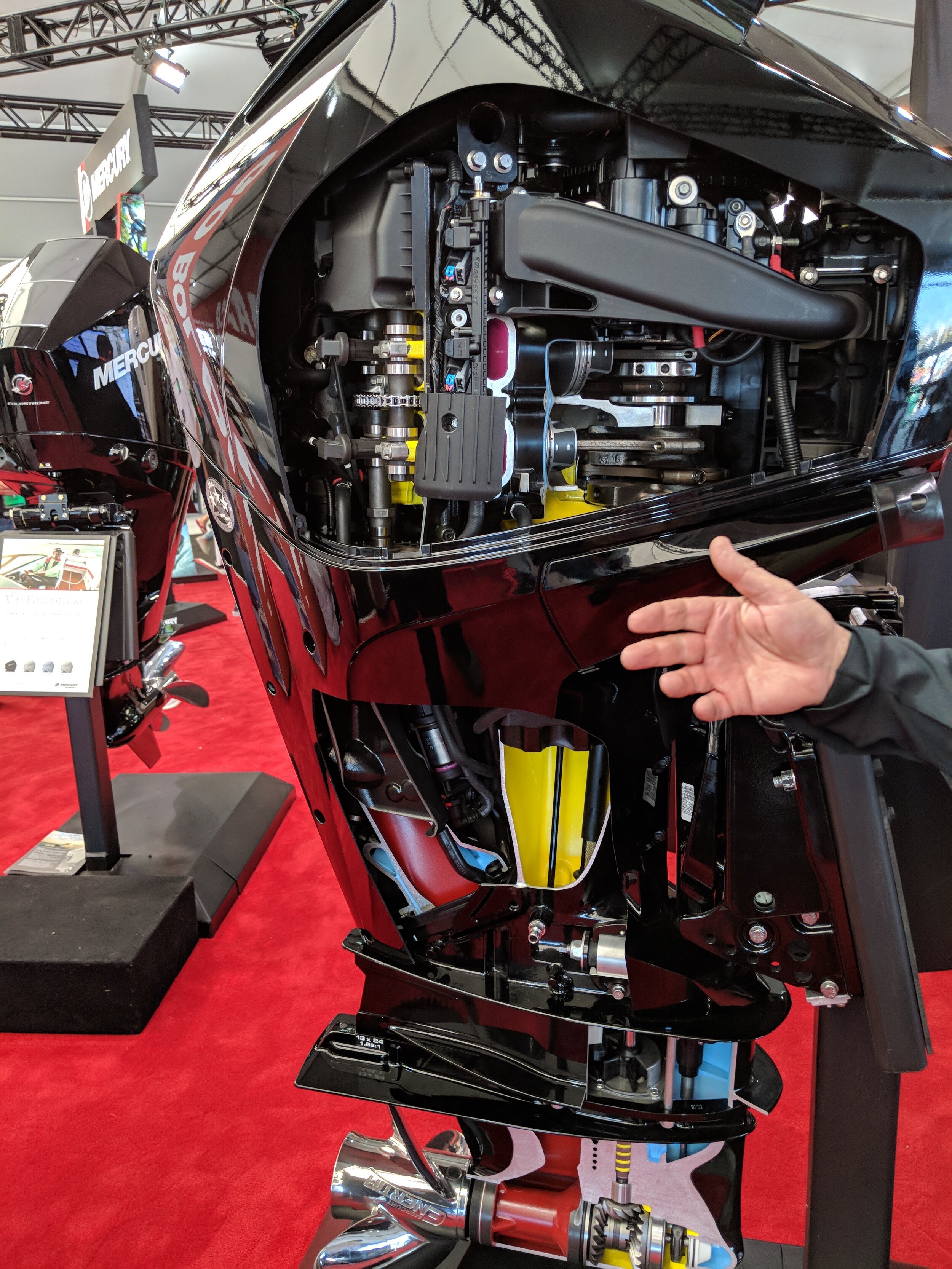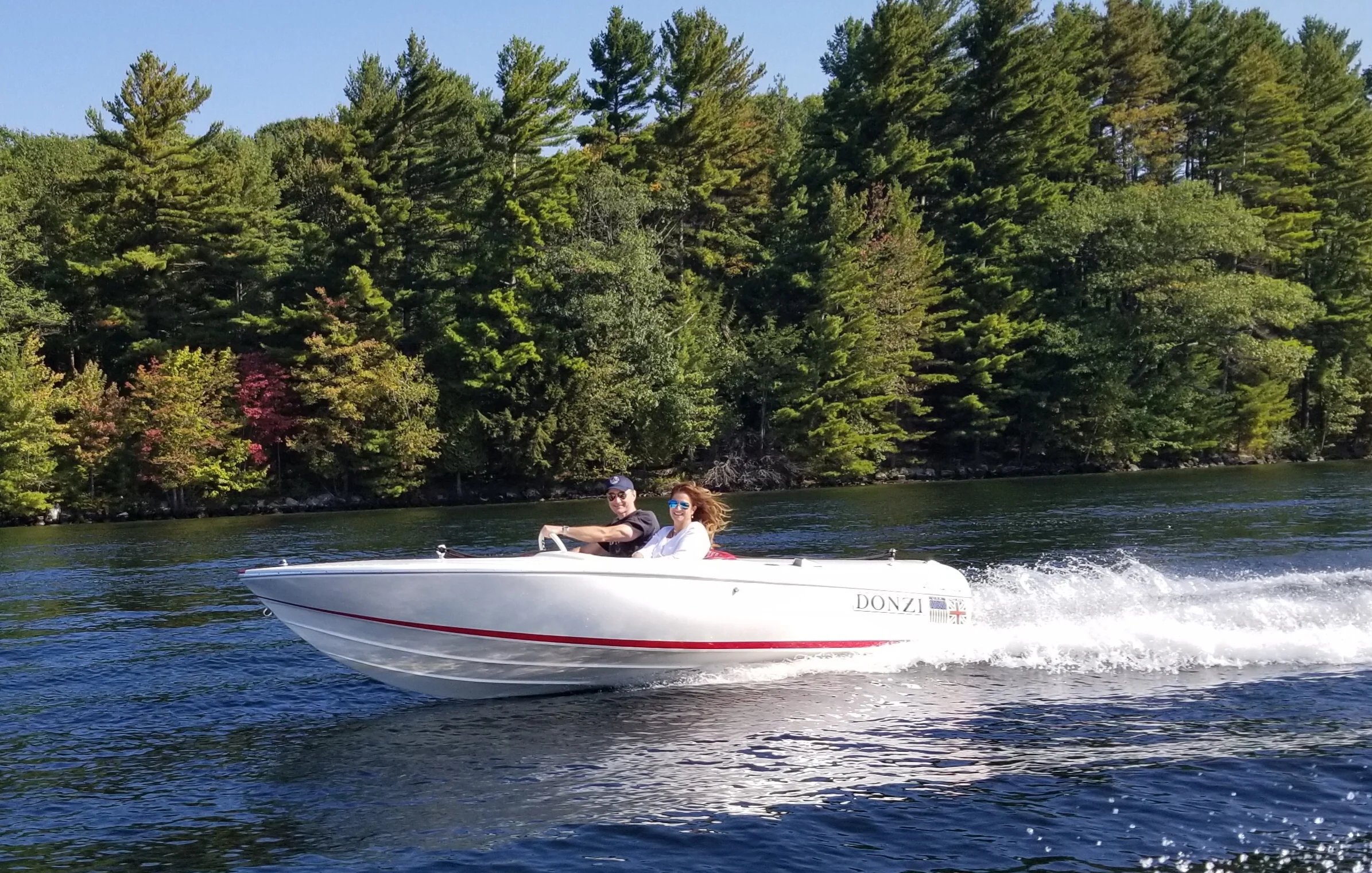The Top 225 Horsepower Outboards Available Now
When it comes choosing the right engine for your boat, obviously horsepower is a huge consideration but so are cost and features. In 2019 we have some great options, and although we complain about the lack of light true performance engines, a modern 200 to 300 horsepower outboard is as reliable and powerful as ever. Modern engines are just really good and have many features that optimize their performance.
Even though Mercury Racing is the only brand making true hardcore performance outboards, there are some “semi” performance outboards on the market worth considering and some you can modify slightly to make more performance oriented. To me, the 225 horsepower range is a sweet spot. Sure, the 250R and 300R are killers out of the box but not everyone can spend that kind of money. So a 225 fits nicely in the price to power ratio for many single engine outboards. Here are the top 225 outboards in 2019 in no particular order. We rank them at the end.
Mercury Marine 3.4 225 V6
Mercury Marine has two good candidates for 225 horsepower. First, let’s look at the V6. Introduced in Miami in 2018, the dual overhead cam, 3.4 Liter outboard was the first look at Mercury’s new platform. What makes the V6 appealing to me is the fact that it’s about 30 + pounds lighter than the new V8 ProXS 225. Featuring a 4.88” gearcase, with 185:1 gears and digital controls, this engine is a good repower option as it can utilize mechanical controls as well. More compact than the V8, and slightly lighter than the outgoing 3.0L Optimax, the 3.4 Liter four stroke has loads of torque.
The Merc V6 225 is not really a performance engine, but on a lighter boat it could be a good option. You could add solid lower mounts and have the lightest 225 on the market.
The biggest difference with the 225 over the 200 V6 is that it revs up to 200 more RPM than the lesser horsepower models. Mercury claims the engine has a dry weight of 475 Lbs, which isn’t too bad. For the life of me I can’t figure out why Mercury Does not have a ProXS version of this in 225 or even a Mercury Racing R version. The 30 pound advantage, and more compact proportions just lend it to being a little better in some ways. Technically, the V6 Mercury is the smallest 225 outboard on the market, which is a plus to me. The unique mount system on the new Mercury’s mean you could probably install the V8 solid lower mounts found on the Mercury Racing V8s to improve handling. Could you install a Gen 2 Torque Master, or 3.0L Sport Master? Maybe. Would people want a V6 225 tuned a little with those features? Yes.
The 4.88” gearcase with 1.85 gears is a nice lower unit for the V6 225. Would love to do a side by side of this against the other 225s.
Mercury 4.6 225 ProXS V8
To me, if you’re running a boat that is a little heavier, the advantage of the V8 225 is the torque, the ability to rev even higher to 6200 RPM, and the Torque Master gearcase with 1.75 gears. With stiffer mounts and a lighter cowl than a regular 4.6 V8, the ProXS version is a pretty solid option, coming in at 505 Lbs. Everything else being equal, the Mercury ProXS 225 will outperform its little brother V6. If I had a really light small boat, I would be inclined to try the V6. But, most of the time the V8 is the way to go.
Beast
The ProXS 225 is a sweet spot, Torque Master 1.75 gearcase, 6,200 RPM, stiffer mounts and it’s a V8!
With the 225 ProXS, you are saving a decent chunk of change over a 250R, and it probably wouldn’t be much slower. This is kind of a sleeper engine on the market. Since so many bass boats have them, they will probably be available on the used market readily in a few years. On most performance boats, the Mercury 225 ProXS will be faster than the other engines in this category, they all put out similar horsepower, but the ability to rev higher with taller gears means the Mercury will spin that prop a bit faster, translating to higher speed with everything else being equal. There is no doubt the V8 just sounds cool too.
Everything else being equal, this will be the top performer here, checks almost all the boxes.
Yamaha 4.2 225 Vmax SHO
Compared to the other outboards on this list, the Yamaha is a little long in the tooth having been on the market since 2009. This is good in some ways. First, there are some aftermarket performance upgrades available for the popular 4.2 Yamaha platform. You can add solid mounts, a beefier propshaft, and even flash the ECU to greatly increase power. Even out of the box, the big Yamaha is a solid bet. Advertised at 505 Lbs, which is hard to believe when you look at it, but it’s probably similar in weight to the other 225 outboards on the list.
Ahead of its time when introduced, the big Yamaha is now long in the tooth. They still are solid options.
These engines seem tough to find used and are generally a little on the pricier side than the others but you certainly be confident you have one of the most bulletproof and proven outboards on the market. The torpedoed lower unit has a front low water pickup and 1.75:1 gear ratio. If you’re getting picky, the graphics on the Vmax SHO engines are brutal. There are more colors on the engine than Elton John’s scarf collection has. You could say it is cartoonishly big as well but the other engines are quite big as well.
Aftermarket
You can tune these things in many ways, mounts, propshafts, ecu tunes, superchargers.
If you aren’t shy about modifying your engine, this might be the best option. At the very least, I’d get the “fat” shaft and the solid mounts. This makes the big Yamaha much improved and allows you to run the engine higher, while improving handling. The ECU tune is reportedly very effective. And, if you’re really in the mood to spend some money, there is a supercharger kit from Nizpro Marine available that gets the 4.2 V6 into the 400+ HP big boy club. Hydro Tec has been offering performance parts for Yamaha for decades and can help you tune your Yamaha with their own parts.
Evinrude G2 3.4 225 HO
Not many engines in this category can differentiate from one another technically, but the Evinrude can. Loaded with unique features, the Evinrude 225 G2 HO features integrated hydraulic steering with DPS (digital power steering), iTrim automatic trim and is the only two stroke on the market. The big 3.4 Liter two stroke is a super efficient, clean burning engine with virtually no smoke and in many cases is more efficient than its four stroke counter parts. This is in part because of Evinrude’s precision direct injection system, and how the engine delivers the precise amount of oil for lubrication, monitored down to the millisecond.
Customization, packed with features. There is a lot to like about this two stroke power house from Evinrude
The only drawbacks I see are the lower 1.85 gears than the Mercury and Yamaha (both with 1.75) and the RPM range to 6,000 RPM is shy of the Mercury V8, but matches the Yamaha. I have run our G2 Evinrude 250 HO, and it is truly an amazing engine. The clean rigging with the integrated steering is really nice. However, my 250 is slightly different, a little known fact is the 250 HO is the only big block G2 you can get without DPS. The DPS system is added to the integrated hydraulic steering to allow the driver to adjust steering feedback, and allow for iSteer features. Mine doesn’t have that because some bass boat manufacturers felt the steering was more precise without it, plus it weighs about 10 lbs less without DPS as well. I haven’t driven the DPS version, so I can’t comment, I would like to try one and see if the steering feel could actually be “tightened” as it is a bit soft at higher speeds. In general though, the integrated steering is a game changer and is really slick.
At 547 pounds, it would appear the Evinrude is the heaviest in this comparison but if you factor in the integrated steering and the heavy cowlings on the others, I can assure you they are all pretty close. Manufacturers are weighing these engines with no cowl and dry, and even then the real world weights seem a little heavier than the optimistic ones on the spec sheet.
The unique swivel bracket on the Evinrude G2, this one housing the integrated steering and DPS. There is nothing on the market like it, making it truly a differentiation from other outboards.
The evinrude has a 2 gallon oil tank under the cowling that is extremely easy to access. Plus, that much oil can give you approximately 50 hours of run time, which is fairly significant. With no oil changes or valvetrain maintenance, the Evinrude G2 is fairly light on service as well.
To me, the steering and two stroke power are big pluses. If the G2 HO engines had stiffer motor mounts, they would be much improved and the steering would feel more precise. That said, none of the other engines have solid mounts either, so it’s a wash. The gear case has low water pickup and can be run reasonably high, so again, this is a really competitive category. One more feature is the ability to choose multiple colors, dark grey or white base, with multi colored side panels and swoosh.
Replacement panels are also an innovative feature on the Evinrude, as opposed to a traditional cowling.
Ranking the latest 225 outboards
1) Mercury 225 ProXS V8: Best combination of gear ratio, weight, higher RPM range. Will be the fastest 225 and it sounds cool.
2) Evinrude G2 225 HO: Powerful two stroke, efficient, integrated steering, digital controls, multiple color options.
3) Mercury 225 3.4 V6: Lighter, smaller and priced well. This engine is the best choice if you have a lighter boat, and want to save a few bucks. Very attractive specs compared to the bigger 225s on the market.
4) Yamaha 225 Vmax SHO: Great choice for the hot rodder, you can improve this engine with aftermarket accessories. The big displacement is good and bad, low RPM torque is great but it’s a bit of a pig on fuel. I think Yamaha has a new V6 coming soon which should be quite good.
Summary
As suggested in each description, this is a really competitive category. You often see 20” 225 horsepower outboards on bass boats, flats boats, bay boats and in twin configuration on sport center consoles. They are a great value horsepower range with impressive performance. Historically, Mercury Racing and regular Mercury’s had really “hot” 225 models, from the venerable 225 Pro Max, the Mercury Laser 220 XRI, and later the 3.0L 225 EFI all were pretty potent out of the box. Yamaha had the 225 Excel, which was a great engine and really well known for its reliability. Evinrude and Johson had the 2.6 GT / XP which were 235 HP, and later a 3.0L version of the 225.
Since we are spoiled now with 300, 400 and 450 HP engines, it’s easy to forget that 225 horsepower was a big outboard not that long ago, and 300 HP was almost exotic. 225 is a great power range for single outboard sport boats. If you are repowering and want the performance and save some money, these latest 225 outboards are hard to beat.















